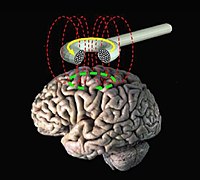
Photo from wikipedia
BACKGROUND Although the application of repetitive transcranial magnetic stimulation (rTMS) for treatment of depression has been well investigated, there are few biological predictors of clinical outcomes to rTMS treatment. Previous… Click to show full abstract
BACKGROUND Although the application of repetitive transcranial magnetic stimulation (rTMS) for treatment of depression has been well investigated, there are few biological predictors of clinical outcomes to rTMS treatment. Previous studies have suggested that the loudness dependence of auditory evoked potentials (LDAEP) can be used as a predictor of response to antidepressant treatment. However, little is known about the association between rTMS and LDAEP. The present study aimed to investigate whether baseline LDAEP is associated with clinical changes to rTMS treatment in patients with major depressive disorder (MDD), and to explore the effect of high-frequency rTMS on LDAEP. METHODS Thirty patients were randomized to receive 15 sessions of active (n = 15) or sham rTMS (n = 15). LDAEP and clinical measures of depression were assessed before and after 10 Hz rTMS treatment for 15 days. RESULTS Baseline LDAEP was associated with changes in scores on the Hamilton Rating Scale for Depression. There were no significant effects of rTMS on LDAEP. Patients with high LDAEP exhibited more favorable clinical changes than those with low LDAEP following treatment with rTMS. LIMITATIONS The sample was relatively small, and the participants were not divided into responders and non-responders group due to small sample. An influence of medication has not been controlled. CONCLUSIONS Our findings suggest that high baseline LDAEP may be associated with favorable clinical changes to rTMS treatment in patients with MDD. Further studies are required to replicate and validate the potential use of LDAEP as a predictor of clinical changes to rTMS treatment.
Journal Title: Journal of affective disorders
Year Published: 2018
Link to full text (if available)
Share on Social Media: Sign Up to like & get
recommendations!